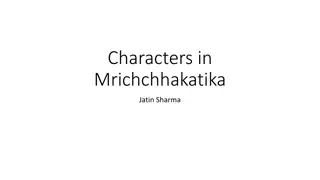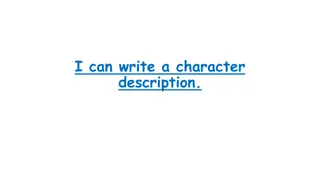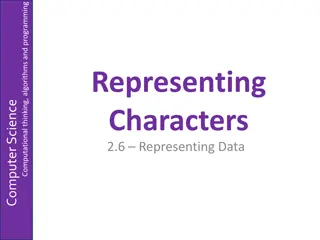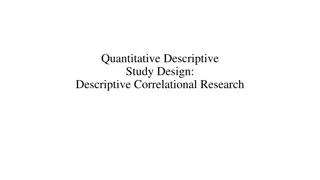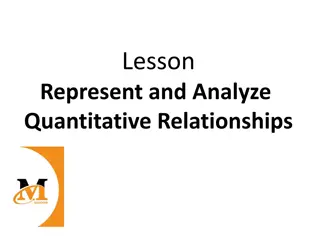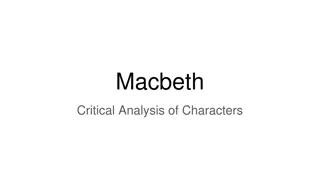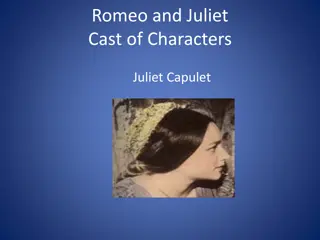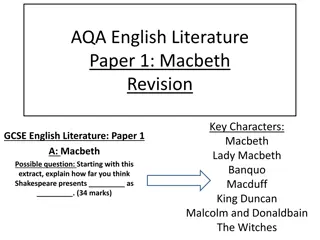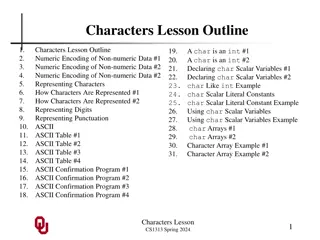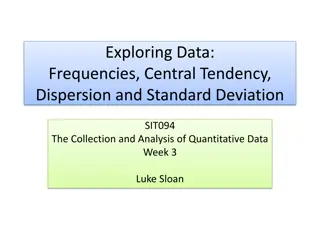Overview of Research Process and Quantitative Research Phases
The research process involves steps like identifying, locating, assessing, and analyzing the research question to find answers. It includes quantitative and qualitative approaches, with specific phases like conceptual, design, empirical, analytic, and disseminating phases in quantitative research. E
9 views • 27 slides
Characters in Mrichchhakatika
The play Mrichchhakatika features a diverse cast of characters including the narrator, Sutradhar, and his wife Nati, the hero Charudatta who is a Brahman merchant in financial distress, the courtesan Vasantasena who loves Charudatta, the villain Sakara, and various other associates, officers, and re
0 views • 6 slides
Understanding Quantitative and Qualitative Research Methods
Exploring the differences between quantitative and qualitative research methods, this content delves into the importance of qualitative research, various methodologies such as focus groups and interviews, data collection, research ethics, and analysis techniques. It also covers the elements of the r
4 views • 43 slides
Exploring "Sailmaker" by Alan Spence: Themes and Characters
Dive into Alan Spence's "Sailmaker" where the story unfolds tragedy and relationships between characters like Alec and Davie. The play explores themes of grief, family dynamics, and the impact of loss. Through the characters' interactions, the author delves into the complexities of human emotions an
0 views • 41 slides
Explore the Characters of "My Sister" by Annabel Pitcher
Dive into the world of "My Sister" by Annabel Pitcher and get to know the main characters, settings, and themes of the novel. Discover the complexities of Jamie's character and explore the relationships, personalities, and appearances of the characters in this impactful story.
0 views • 11 slides
Exploring Characters and Themes in Of Mice and Men
Delve into the characters of Candy, Crooks, Lennie, Carlson, Curley's wife, Slim, George, Curley, and the author John Steinbeck in the classic novel Of Mice and Men. Discover the setting, the challenges faced by the characters, and the themes of friendship, loneliness, dreams, and the harsh realitie
1 views • 31 slides
Introduction to Isixhosa Language and Literature - Exploring Characters and Themes
This content provides an overview of Isixhosa as a first additional language (FAL) and delves into key aspects of literature such as character development and themes. It discusses the importance of characters in storytelling, emphasizing the significance of round and flat characters. The article als
3 views • 28 slides
Mastering Character Descriptions: Techniques and Examples
Learn the art of describing characters effectively by providing details such as name, appearance, personality traits, special abilities, relationships with other characters, and more. Explore captivating character descriptions of Willy Wonka and the Gruffalo to understand how vivid adjectives and ca
3 views • 9 slides
Understanding Structural Information in Phytosystematics: A Molecular Perspective
Exploring the significance of taxonomic characters in molecular advances of phytosystematics, this class delves into the role of structural attributes in determining relationships between taxa. From considering gross morphological characters to analyzing morphological characters under microscopes, t
0 views • 24 slides
Analysis of "Le Tartuffe" by Molière: Characters, Themes, and Religious Context
Le Tartuffe," written by Molière in 1669, delves into themes of religion, hypocrisy, and the interplay of characters within a bourgeois household. The story revolves around Tartuffe, a hypocritical character who manipulates the head of the household, Orgon, while others like Cléante and Elmire ser
0 views • 25 slides
Understanding Character Sets in Computer Science
Alphanumeric characters, special symbols, and control characters play crucial roles in representing data through character sets like ASCII and Unicode in computer science. ASCII, with its 7-bit binary codes, represents 128 characters, while Extended ASCII allows for 256 characters. Unicode covers a
1 views • 12 slides
The Literary Characters in Christopher Marlowe's "Dr. Faustus
Christopher Marlowe, a prominent Elizabethan playwright, introduced unforgettable characters in his masterpiece "Dr. Faustus." The play revolves around Faustus, a scholar who sells his soul to the devil in exchange for knowledge and power. Mephostophilis, Faustus' manipulative tormentor, and other c
0 views • 25 slides
Understanding the Last Chapter: Unraveling Secrets with Clever Characters
In the last chapter, the characters reveal secrets related to Howard Carter, leading to intriguing developments. Mrs. Mendoza's narrative is anticipated, hoping for a positive outcome and no curse. As the story unfolds, the mystery deepens, prompting questions about the characters' next moves in Egy
0 views • 7 slides
Contrasting Qualitative and Quantitative Traits in Genetics
Genetic traits in organisms can be qualitative or quantitative, with qualitative traits controlled by single genes and showing distinct variations, while quantitative traits are influenced by multiple genes and environmental factors, resulting in continuous variations. Qualitative genetics focuses o
0 views • 13 slides
Understanding Quantitative Research Design in Social Science
This content covers various aspects of quantitative research design, including descriptive and correlational studies, research design blueprint, robust research design considerations, and different types of research approaches. It emphasizes the characteristics, techniques, and terminologies associa
0 views • 24 slides
Understanding Quantitative Analysis for Decision Making in Management
Quantitative analysis is a crucial scientific approach for managerial decision-making, involving data manipulation to derive valuable information. This method encompasses problem definition, model development, and acquiring input data. Mathematical models, variables, and parameters play key roles in
0 views • 11 slides
Qualitative vs. Quantitative Approaches in Health Research
Exploring the different methodologies, paradigms, and methods used in health research, this content highlights the distinction between qualitative and quantitative designs. It covers research questions, aims, objectives, hypotheses, and various quantitative approaches such as experimental and observ
1 views • 28 slides
Understanding Quantitative Genetics Principles in Animal Breeding
Quantitative genetics focuses on the inheritance of characteristics based on degree rather than kind, compared to qualitative genetics. It involves polygenes controlling quantitative traits, which exhibit continuous variation and can be measured using metric units. Qualitative traits, on the other h
0 views • 22 slides
Understanding Quantitative Research in Social Studies: A Comprehensive Overview
An in-depth exploration of quantitative research methods in social studies, covering concepts, data analysis, survey techniques, causality identification, and setting up research projects. Emphasizes the importance of grasping strengths, pitfalls, and key points in quantitative research and understa
0 views • 51 slides
Project EDDIE: Enhancing Student Quantitative Reasoning with Large Datasets
Project EDDIE focuses on improving student quantitative reasoning through inquiry-driven exploration of complex datasets. The project aims to support instructors in guiding students to enhance their understanding of scientific concepts and quantitative skills. With a commitment to community and lear
0 views • 6 slides
A Comparative Analysis of Controllers and Followers in "Othello" and "A Streetcar Named Desire
The paper explores the dynamics of control and submission in "Othello" and "A Streetcar Named Desire," focusing on the characters' roles as controllers, followers, masters, and slaves. It delves into the methods of gaining control, such as through authority, language mastery, and sexual seduction, h
0 views • 37 slides
Understanding and Representing Quantitative Relationships
Explore how to represent and analyze quantitative relationships using graphs, tables, and equations. Practice with unit rates, plotting points in a coordinate plane, and understanding independent and dependent variables. Develop skills in creating equations, tables, and graphs to model relationships
0 views • 120 slides
Engaging Activities Based on Romeo and Juliet Characters
Explore a variety of interactive activities inspired by the characters from Shakespeare's Romeo and Juliet. From book collections to figurative language analysis, character cards, charades, and more, these engaging tasks offer a fun and educational way to delve deeper into the play's themes and char
0 views • 35 slides
Macbeth: Critical Analysis of Characters
A detailed examination of key characters in Shakespeare's play "Macbeth," including Macbeth himself, Lady Macbeth, the Three Witches, Macduff, Malcolm, Duncan, and Banquo. The analysis delves into the positive and negative traits of Macbeth, the characteristics of Lady Macbeth as a complex figure, t
2 views • 11 slides
Understanding the Impact of Characters' Actions in Literature
Characters' actions in literature play a crucial role in moving the plot forward by causing a chain of events with significant consequences. Each action leads to a specific outcome, shaping the narrative and defining the characters' roles within the story. Through examples like Viola in "Twelfth Nig
0 views • 8 slides
Exploring Violence in the Novel: Characters, Themes, and Society
Violence in the novel is depicted through physical, psychological, and emotional means, highlighting the harsh realities faced by the characters. The analysis delves into the characters' violent tendencies, societal acceptance of violence on the ranch, and the complex dynamics between characters lik
0 views • 4 slides
Odyssey Book 1 & 9 Quiz Review: Key Themes and Characters
In this quiz review, delve into the themes and characters of Books 1 and 9 of "The Odyssey." Explore Odysseus' homeland, interactions with deities like Athena, and the narrative drift within the epic. Learn about key scenes such as the encounter with the Cyclops Polyphemus and the challenges faced b
0 views • 41 slides
Romeo and Juliet: Cast of Characters, Setting, and More
In the classic tale of Romeo and Juliet set in the fourteenth century in Verona and Mantua, the story unfolds with a rich cast of characters from the rival Capulet and Montague families. Juliet, Romeo, Lord and Lady Capulet, Lord and Lady Montague, Mercutio, Friar Lawrence, and others play pivotal r
0 views • 6 slides
TKAM Final Quiz Review: Characters, True or False, and Answers
In this comprehensive quiz review, you will match characters to their descriptions, answer true or false questions about the story, and evaluate statements related to the plot and characters of "To Kill a Mockingbird." Test your knowledge on key figures like Atticus Finch and Scout as you review imp
0 views • 53 slides
Exploring Themes and Characters in 'Sold' by Patricia McCormick
A literature circle group comprising Tyler Owens, Kaitlin Walashek, Wendy Hwang, and Ashley Keating delves into the plot, themes, characters, and setting of "Sold" by Patricia McCormick. The group discusses the internal and external conflicts faced by characters like Lakshmi and Mumtaz, the resilien
0 views • 7 slides
Exploring Key Characters and Themes in Shakespeare's Macbeth
Shakespeare's Macbeth delves into the intricate portrayal of characters like Macbeth, Lady Macbeth, Banquo, Macduff, King Duncan, and others, set against a backdrop of ambition, power, and betrayal. Through rich language, structure, and form, Shakespeare weaves a narrative that explores themes of am
0 views • 14 slides
Understanding Numeric and Character Encoding in Programming
In the world of programming, numeric encoding is used to represent non-numeric data for various purposes. This includes encoding different entree options or characters in a natural language using fixed numeric values. Understanding how characters are represented numerically is crucial for efficient
0 views • 31 slides
Understanding Character Traits and Types in Literature
Character traits in literature help define and understand characters, with internal qualities shaping external behaviors. Authors can teach readers about characters through actions, descriptions, speech, interactions, and judgments. Characters can be round (dynamic) or flat (static), and the protago
0 views • 24 slides
Key Themes and Characters in Harper Lee's "To Kill a Mockingbird
Explore the key themes and characters in Harper Lee's classic novel "To Kill a Mockingbird," including discussions on prejudice, family values, courage, cowardice, loneliness, justice, and growing up. Get insights into memorable characters like Atticus Finch, Boo Radley, Jem, Scout, and more.
0 views • 52 slides
Understanding Research Methods in Public Health
Exploring the nuances of qualitative and quantitative research methods in the context of public health, this content delves into how each approach offers unique insights and perspectives. It discusses the importance of qualitative research in uncovering underlying factors influencing health, interpr
0 views • 77 slides
Quantitative Research Framework for Historical Disciplines
Scholarly communities in historical disciplines are combining quantitative and qualitative methods to study phenomena that change over time. The proposed general methodological reflection aims to enhance research in historical linguistics through quantitatively driven models and claims. Quantitative
0 views • 18 slides
Exploring Story Characters with Speech Bubbles Activity
Dive into the world of storytelling by exploring different characters in a tale. Engage in a creative exercise where you imagine what characters might say and do. Enhance literacy skills by writing speech bubbles for characters in the story, focusing on spelling, letter formation, and punctuation. L
0 views • 6 slides
Understanding UV-Visible Spectrophotometry for Quantitative Analysis
Spectrometry in quantitative analysis involves determining substance concentration through spectrophotometry. UV-Visible Spectrophotometry measures light absorption in the UV or visible region using the Beer-Lambert Law, relating absorbance to substance concentration. The electromagnetic spectrum en
0 views • 15 slides
Empowering Through Quantitative Literacy: A Roadmap to Mathematical Empowerment
In a modern society filled with data and statistics, quantitative literacy is essential for individuals to think critically, question authority, and make informed decisions. The ability to understand and engage with mathematical concepts is crucial for addressing complex issues and thriving in today
0 views • 15 slides
Understanding Quantitative Data Analysis in Research
Dive into the world of quantitative data analysis with a focus on frequencies, central tendency, dispersion, and standard deviation. Explore the collection and analysis of numerical data, levels of measurement, and methods for quantifying social concepts. Learn about the importance of capturing data
0 views • 25 slides

